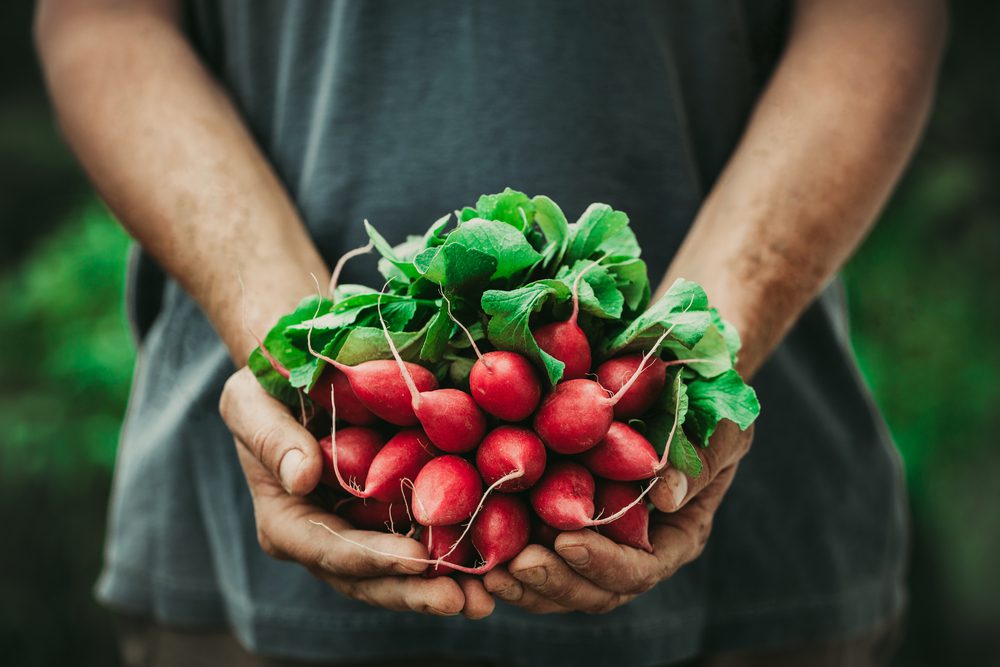The Climate Crisis, which sits at the intersection of many social and environmental justice issues, is one of the biggest issues facing the world today. As the United Nations Climate Change Conference (COP26) gears up to start in Glasgow on October 31st, there is still a large gap in the conversations about the role food and agriculture play in the climate crisis. It is calculated that agriculture, forestry and land use account for approximately 24% of greenhouse gas emissions. But this analysis is incomplete, as it focuses primarily on emissions generated on the farm and does not include ongoing land conversion, agricultural driven deforestation, food waste, input production (fertilizers and pesticides) and the global transportation network that facilitates industrial agriculture.
How Did We Get Here?
Small farmers, including fishers, pastoralists and indigenous people and farmworkers are on the frontlines of the climate crisis. Agriculture has a long history of negative social and ecological impacts, from forced labor and slavery, Indigenous land theft, and colonialism to the destructive nature of rapid industrialization. Modern industrial agriculture is rooted in colonial models, where intensive plantation economies were set up with the goal to extract as much wealth and resources as quickly as possible, relying on slave labor theft of Indigenous land and draining natural resources.
The 1950s and 60s began a period of industrialization of agriculture around the world by developing high-yielding varieties of cereal grains that are grown with modern scientific methods of utilizing synthetic fertilizers, agrochemicals, and pesticides. This period, dubbed as the Green Revolution, was often promoted under the guise of poverty and hunger reduction but despite creating huge surpluses, hunger actually increased, genetic diversity declined, and farmers were further impoverished. Largely due to the monopolies and control of agricultural mega corporations like Monsanto (now Bayer), peasant farmers and social movements have resisted the Green Revolution’s advance since its inception, most recently with the massive 2020 Farmer Protest in India.
Agriculture as Extraction
The expansion of the global agricultural footprint is the cornerstone of extractive agricultural practices. Agriculture land becomes increasingly degraded due to industrial practices, threatening the global insect population and destroying biodiverse ecosystems. As land gets degraded, those profiting continually look to convert more productive land through deforestation and burning, displacing local, Indigenous and rural communities.
Built upon years of exploitation, agriculture’s legacy is one of deep structural human rights abuses. Farmworkers and workers across the food system are saddled with low wages, lack legal protections, retaliation for organizing and unionizing, health hazards due to pesticides and fertilizers and exacerbated dangers from climate change effects of high heats, massive flooding and hazardous air quality. Women farmers are regularly excluded from holding land rights and accessing credit, limiting their agency over their livelihoods, children and homes. Farmers and indigenous people are stripped of land and territory rights and those who fight against extraction are targeted and killed, with 227 Land Defenders killed in 2020. The symptoms of the extractive model are visible on the farm and plantation–and they extend the conversion of national agricultural economies to export-led growth, trapping poor countries in an underdevelopment cycle.
Former colonies have remained trapped in cycles of dependence to rich countries, replicating colonial economic structures, including forced and child labor, poverty wages and unfair payments farmers’ production. Unequal free trade agreements, gutting of local and regional economies and production, transnational corporation control and exploitative development policies shackles former-colonies to global systems dominated by wealthy countries.
Agroecology and Climate Change
Although the pressure from the Green Revolution models of thinking and global capitalist economies in market and policy pushes agriculture towards monocultures and large farms, small farmers continue to feed the majority of the world. Known as the “productivity paradox,” small farmers produce more food on less land with small farmers feeding 70% of the world using only 25% of the agricultural resources.
Small, peasant and indigenous farmers practicing agroecology are building off of traditional knowledge, protecting biodiversity, and farming in ways that mimic natural land. All this while feeding the world. Agroecology is an integrated approach to integrate relationships between plants, animals, humans and the environment while taking into consideration the social aspects that need to create a sustainable and fair food system. Unlike other concepts like “sustainable” and “organic,” which focus exclusively on practices and prohibitions, agroecology is a holistic approach that combines indigenous knowledge with academic research, farmer livelihoods and economic & social components to address the root causes of problems and seek long-term solutions.
While agroecology is highly specific to localized contexts, the various practices of agroecology (such as intercropping, traditional fishing and mobile pastoralism, integrating crops, trees, livestock and fish, manuring, compost, local seeds and animal breeds, etc.) are grounded in the same ecological principles of managing biodiversity, building life and nutrients in the soil, restoration of water, and energy conservation.
False Promises and Corporate Capture
Corporations and institutions are working to greenwash conventional agriculture as “regenerative” or “climate-smart” or “carbon farming”, all while ignoring the power inequity in the food system and the material conditions of farmers, farmworkers and other workers from the global majority. “Carbon Markets” are emerging in the agriculture sector as dirty industries look to “offset” their greenhouse gas (GHG) emissions through schemes that purport to enhance agricultural soil’s capacity to sequester carbon. Commoditizing carbon only enriches wealthy landowners, all while incentivizing and rewarding activities that violate human rights, like land grabbing and displacing Indigenous, rural and forest communities from their land.
Despite consensus on the destructive impacts of industrial agriculture, the Food and Agriculture Organization (FAO) and other bodies of the United Nations continue to prioritize the interests of transnational corporations and agribusiness over significantly investing in community-driven agroecological solutions.
Peasant and Farmer Movement Solutions
Global movements of peasants, smallholder farmers, Indigenous people and farmworkers are not just pushing back on the industrialized food system that is fueling the climate crisis, destroying local ecosystems and biodiversity and violating human rights. Instead, they are actively putting into practice a vision that supports people and the planet.
La Via Campesina, a movement of millions of peasants, small and medium-size farmers, landless people, women farmers, indigenous people, migrants and agricultural workers, has been organizing for food sovereignty since the 1990s. Food sovereignty is defined as “the right to healthy and culturally appropriate food produced through sustainable methods and their right to define their own food and agriculture systems. It is based on a model of small-scale sustainable production benefiting communities and the environment. It includes the struggle for land and genuine agrarian reform that ensures that the rights to use and manage lands, territories, water, seeds, livestock and biodiversity are in the hands of those who produce food and not of the corporate sector.” Smallholder farmers and peasant communities are already building off of a strong history of practicing alternatives to our industrial, corporate dominated food system that prioritize life over profits.
Seed Sovereignty in Puerto Rico
A large component of the fight for agroecology and food sovereignty is the fight for seed sovereignty. Restoring biodiversity to our food system and our planet is critical to adapt agricultural systems to climate change. According to the United Nations, 75 percent of crop diversity has been lost over the past century, largely due to corporate control of seeds, Green Revolution-era seed laws, intellectual property claims and gene modification.
Puerto Rico is one of the world’s largest GMO seed producers (Genetically Modified Organism), with Monsanto and Bayer producing the majority of soybean and cottonseed used in the United States on the island. El Departamento de la Comida, a grassroots collective in San Juan, Puerto Rico, and many other grassroots organizations, are creating alternatives to federal agencies and multinational corporations for food and farming through seed-saving and food sovereignty. Seed sovereignty is about more than just preserving biodiversity but also allows Puerto Ricans, like other communities, to reclaim an identity that has for many generations been an object of attack, colonization, and erasure. Seed saving is an ancient, ancestral practice and communities are continually fighting for seed sovereignty and against the industrialization and privatization of seed.
Agroforestry in Peru
Cooperativa Agraria Cafetalera Pangoa (CAC Pangoa) is a cooperative of 691 farmers and families growing coffee and cacao in San Martin de Pangoa, Peru. CAC Pangoa is focusing on growing coffee and cocoa diversified agroforestry systems to continue to improve soil health, provide shade to cocoa and coffee, and provide timber and fuel wood. Working to produce locally made organic inputs to avoid the pollution caused by transporting it over long distances, Pangoa produces kobashi organic fertilizer for cooperative members. José Luis Arroyo Unchupaico from CAC Pangoa notes that Climate change has created more pests and diseases for cocoa farmers in the region, organic farming and agroforestry have helped manage and reduce these pests and disease threats.
Finca Biodinámica in Honduras

Café Orgánico Marcala (COMSA) and the ‘Finca Biodinámica’, Biodynamic Farm, is based on an organic agricultural system that is fundamentally oriented to life, maintaining the health of the soils, the ecosystems that surround it and the people who are in relation to it. COMSA is a leader in organic, biodynamic and agroecological practices of protecting soil with organic material, providing the necessary nutrients for crops using soil microorganisms, implementing diverse agroforestry practices and planting according to natural cycles. The ‘Finca Biodynámica’ is about more than soil, carbon sequestration and crops, but focuses on developing a conscious connection with local ecosystems, communities and Mother Earth.
Food sovereignty and agroecology is rooted around the sharing of rural, local and Indigenous knowledge. COMSA focuses on sharing knowledge and community with future generations through the COMSA International School, where the cooperative has created a schooling system rooted in respect and care for the environment, for oneself and for the community. ‘To survive we must think and act differently than the conventional [agriculture] systems, to evolve with a view on the long-term, diversifying, working with our children’
Farmworker Organizing in Honduras

The Honduran farm worker union STAS (El Sindicato de Trabajadores de la Agroindustria y Similares) has been at the forefront of organizing and representing farmworkers in Honduras. Honduras is one of leading exporters of winter fresh produce destined for the US market. Honduras also has a long history of corrupt US-backed governments and abysmal working conditions. In recent years, Honduras has witnessed the deadly combination of eroding human rights conditions and supercharged climatic disasters, including massive flooding.
According to STAS organizer, Ahrax Mayorga, “Honduras is a classic ‘Banana Republic’ with a history of over 100 years of banana production…causing a blight on the landscape, converting natural land and small farms to disasters.” Multinational corporations, like Fyffes’ and their local subsidiaries have continued a model of exploitation of Honduran works and environment alike. Farmworker unions, like STAS, have played a key role in advocating for workers’ rights across the globe. In addition to advocating for essential rights, like collective bargaining agreements, farmworker unions are on the frontlines of the climate crisis, fighting for worker health safety. “Chemical agriculture, along with heat stress, has created a health crisis for farmworkers, happening at the exact time that agriculture corporations are eliminating health benefits and protections for workers and COVID is hitting the countryside,” said Mayorga.
Fair Trade and Food Sovereignty in Nicaragua

Fair trade’s roots are deep in Nicaragua. PRODECOOP, a secondary coffee cooperative in Nicaragua has been at the center of the fair trade movement for almost 30 years. PRODECOOP not only facilitates the export of fair trade coffee for some 38 village-level cooperatives, but provides ongoing farmer extension, training and credit services. These services are particularly critical in the context of coffee in Central America, as coffee farmers have confronted the ongoing coffee pricing crisis, coupled with climate change driven pests and diseases, like “La Roya.”
Key to PRODECOOP’s efforts in recent years has been a focus on agroecology and diversification for food sovereignty. According to Rosalba Gonzalez Baquedano, “We cannot confront climate change, take care of the environment and produce coffee organically without fair trade. Fair trade is our way to have a dignified life and a healthy community.” However, to address the climate crisis in rural Nicaragua is not cheap. As Gonzalez Baquedana mentions, “Adapting to climate change is very expensive for farmers. It requires additional labor, investing in resilient species and improving soil health. Farmers must be paid fairly for the investment we are making in producing health and organic crops.”
Movement of Rural Landless Workers Brazil
The Movement of Rural Landless Workers (MST) is a peasant social movement fighting for land, agrarian reform, food sovereignty and social justice in alignment with la Via Campesina in Brazil. MST has launched a National Plan to Plant Trees and Produce Healthy Food initiative to plant 100 million trees and promote community-led agroforestry in response to the record deforestation and fires as well as the policies of the Bolsonaro government.
The goal is to recover degraded areas through the implementation of agroforestry and promotion of food sovereignty. Alongside this, they fight environmental destruction from agribusiness and mining. MST builds upon traditional, indigenous and peasant knowledge through Campesinas a Campesinas (Farmer-to-Farmer) trainings where peasants come together and share knowledge and organize around agro-ecological practices. MST is actively organizing for Popular Agrarian Reform that aims to redistribute land, produce healthy food for the Brazilian people, preserve the environment (water, land, biodiversity and air), confront all forms of violence and create new social relationships that prioritize people and the planet.
Taking Action for Food Justice & Climate Justice
In order to combat climate change we need strong, multi-faceted climate action. Achieving true climate justice requires systemic change at policy level, divestment from fossil fuels, overhaul of the big-agriculture industry, ensuring human rights and land rights for indigenous communities along with a disruption of all systems of inequality. The solutions to our food system, and its impact on the planet, already exist. Small-scale farmers practicing agroecology and food sovereignty are tackling the root causes of the climate crisis, hunger and poverty. Yet, there are still huge barriers for farmers looking to transition to agroecological practices, from lack of access to financial support, corporate control of seeds and resources to structural barriers like World Trade Organization (WTO), which prioritizes corporate profit, implements policies that human rights and destroy the environment and massively invests in food and farming systems.
We demand that leaders at COP26 divest from false solutions and invest in grassroots-led initiatives to create a food system and world that confronts power inequity, democratizes the control of land, water and knowledge, revitalizes biodiversity and ensures rights and dignity for people and communities.
Take Action for Climate Justice and a Fair Food System:
- Fight back against false corporate solutions that don’t actually address power and stand in solidarity with peasant farmers fighting for just, equitable, healthy, and sustainable food systems!
- Support worker-led organizing that counters corporate power. Give to strike funds, join in on the picket line, call, send letters or sign petitions to support strikers demands.
- Support for alternative economic models by buying fair trade and locally made products and advocating for national, state and local policies to grow the movement for just and ecological food and agriculture systems.
- Support grassroots-led agroforestry projects that support communities as they regenerate the land, support community livelihoods and fight for food sovereignty.
- Fight corporate control of agriculture. Take action by fighting funding for the expansion of factory farms, supporting initiatives like the Real Meals campaign and the Good Food Purchasing Program which fights for fair food systems on campuses, local school districts and city governments.
Alegria Natural uses this content on an effort to amplify the work by Grow Ahead x Fair World Project. To support their work visit: https://fairworldproject.org/












